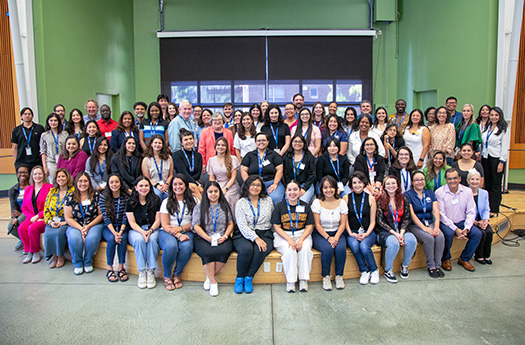Social Justice & Community
UC Santa Cruz hosts HSRU Alliance conference to support Hispanic women in physical sciences and engineering
UC Santa Cruz hosted graduate students, postdoctoral scholars, faculty, and staff from HSRU member institutions for a conference focused on supporting the success of Hispanic women in academic and professional physical science and engineering careers.

Conference attendees included graduate students, postdoctoral scholars, faculty, and staff from HSRU member institutions. (photos by Carolyn Lagattuta)


For the second straight year, UC Santa Cruz hosted graduate students, postdoctoral scholars, faculty, and staff from Alliance of Hispanic Serving Research Universities (HSRU) member institutions for a conference focused on supporting the success of Hispanic women in academic and professional physical science and engineering careers.
The conference, Aug. 6-8, brought together scholars and mentors dedicated to building and strengthening sustainable pathways in academia; the majority were first-time attendees. The conference was designed to foster deeper relationships within the alliance community to encourage coalition building among institutions.
Conference activities centered on the themes of self-advocacy throughout one’s career trajectory and institutional transformation through a connected community. Many sessions also explored the concept of “servingness” — the practice of truly serving the multifaceted Latinx community at Hispanic Serving Institutions, going beyond simply enrolling them.
Participants attended presentations by keynote speakers and panel discussions featuring leaders in academia, research, private philanthropy, and government, took part in breakout sessions, and networked. There were also opportunities to explore the natural beauty of the UC Santa Cruz campus.
Keynote speeches were delivered by Asmeret Asefaw Berhe, Professor of Life and Environmental Sciences at UC Merced who served as Director of the Office of Science at the U.S. Department of Energy from 2022 to 2024; Erika Tatiana Camacho, the Manuel P. Berriozábal, Ph.D. and María Antonietta Berriozábal Endowed Chair Holder, Professor of Mathematics and Neuroscience, Developmental and Regenerative Biology at the University of Texas at San Antonio; Anne-Marie Núñez, inaugural executive director of the Diana Natalicio Institute for Hispanic Student Success and Distinguished Centennial Professor in Educational Leadership and Foundations at the University of Texas at El Paso; and Lisa Cardoza, the first Latina President of American River College.
Speakers and panelists spoke about their career pathways and academic trajectories, emphasizing resilience, humility, and compassion in the face of obstacles such as immigrating to the U.S. or being the first in their family to attend college.
“Breaking stereotypes in academia is not easy; you have to prove to others that you belong, but you also have to prove the same to yourself,” said Camacho, who formerly served as the National Science Foundation Program Director of the ADVANCE, the Racial Equity in STEM Education, and the Hispanic-Serving Institutions (HSI) Programs as well as co-Lead of the HSI Program. Throughout her keynote address, she encouraged students to take action through self and institutional advocacy.
UC Santa Cruz Chancellor Cynthia Larive, who recently began a two-year appointment as chair of the HSRU alliance, facilitated the conference alongside Christina Armstrong, a special adviser to Larive and campus Director of Strategic Initiatives, and Rodrigo Lazo, professor of literature and campus Director of HSRU Initiatives.
“I am deeply proud to be helping lead this national effort to boost the success of Hispanic women in professional science and engineering careers, including in academia,” Larive said. “Bringing together individuals and institutions is how we can best advance pathways to sustainable success. Best practices are passed along, conversations are started, and relationships are built. That’s how sustainable change happens.”
With support from the Henry Luce Foundation, UC Santa Cruz provided participant housing, dining, and parking, while each participant’s home university was asked to cover travel expenses so that travel funds did not present a barrier to participation. The 75 participants came from Arizona State University, CUNY Graduate Center, Texas Tech University, University of Texas at Arlington, University of Texas at El Paso, University of Texas at San Antonio, UC Irvine, UC Riverside, UC Santa Cruz, University of Colorado at Denver, University of Nevada at Las Vegas, University of New Mexico, University of North Texas, and the New Jersey Institute of Technology.
Formed in 2022 and now with 22 member universities from coast to coast, the HSRU Alliance represents every university that has been both categorized as R1 (very high research activity) by the Carnegie Classification of Institutions of Higher Education and designated as a Hispanic Serving Institution by the U.S. Department of Education. The alliance aims to double the number of Hispanic doctoral students enrolled at alliance universities, and increase by 20 percent the Hispanic professoriate in alliance universities.